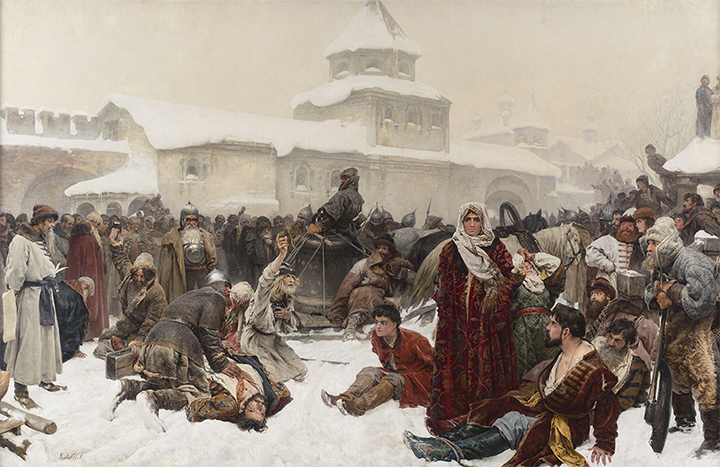I recently had an hour or two free in Madison, Wisconsin and was able to visit the Chazen Museum of Art. They had an exhibition of contemporary African art, which was interesting, but as I often find, rather undermined by the commentary given to the work. It was all rather overdetermined; paintings are doing things like making an argument for liberation. Maybe they are, but the writing certainly doesn’t help me see that.
In the permanent collection I found the following painting, presented without commentary, that I found compelling enough to go to the Wikipedia to work out what was going on:

The Fall of Novgorod is a striking scene of dispossession. The woman, just off to the right center, garbed in rich red, stares right at the viewer, as if to convict the viewer. She is among those being dispossessed, yet in her bearing remains dignified and above the humiliation. There is the bell in the background being dragged away on a sled. Men sit tied in the snow. Others watch on. The sky is darker than the snow.
I find a painting like this powerful in ways that photographs aren’t. In part, it’s because there simply aren’t photographs of the time being depicted. But also there is a craft in the richness of the painting, its composition, it’s saturation that is quite different from what you’d get in a photograph. They are multi-character dramas, rich in detail and expression.
Consulting the Wikipedia to understand the painting misled me. Googling “The Fall of Novgorod” led me to the Massacre of Novgorod in 1570, instigated by a paranoid Ivan the Terrible. This seemed reasonable to me, until I realized that the museum webpage put the scene almost 100 years prior:
The Fall of Novgorod depicts the capture of the City of Novgorod by Ivan III in 1478. Ivan had the city bell—a symbol of self-governance by the citizens—taken down and transported to Moscow. In the painting Marfa Boretskaya, the mayor’s widow and leader of the resistance, stands in silent outrage as Ivan’s troops remove the bell and shackle her partisans.
The Fall of Novgorod
Back in Vienna I was reading The Radetzky March by Joeseph Roth, which was about the twilight of the Austro-Hungarian empire. The Habsburgs ruled a multi-national, multi-ethnic, multi-religious entity, which was the case for many of these large European empires. The painting I saw in Madison depicts the dawn of this era. This is the forcible adoption of an independent city state into a nascent Russian empire; an empire that — like the Austro-Hungarian — would last until the beginning of the 20th century and the outbreak of World War One.